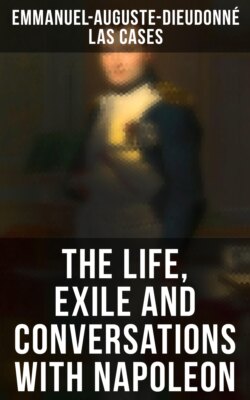Читать книгу The Life, Exile and Conversations with Napoleon - Emmanuel-Auguste-Dieudonné Las Cases - Страница 60
На сайте Литреса книга снята с продажи.
THE EMPEROR’S TEMPERAMENT.—RIDING.—NOTIONS
OF MEDICINE.
ОглавлениеTable of Contents
25th.—The Emperor still continued unwell: he had passed a bad night. At his desire I dined with him beside the sofa, which he was unable to leave. He was, however, evidently much better. After dinner he wished to read. He had a heap of books scattered around him on the sofa. The rapidity of his imagination, the fatigue of dwelling always on the same subject, or of reading what he already knew, caused him to take up and throw down the books one after the other. At length he fixed on Racine’s Iphigenia, and amused himself by pointing out the beauties, and discussing the few faults, to be found in that work. He dismissed me at an early hour.
Contrary to the general opinion, in which I myself once participated, the Emperor is far from possessing a strong constitution. His limbs are large, but his fibres are relaxed. With a very expanded chest, he is constantly labouring under the effects of cold. His body is subject to the influence of the slightest accidents. The smell of paint is sufficient to make him ill; certain dishes, or the slightest degree of damp, immediately take a severe effect on him. His body is far from being a body of iron, as is generally supposed: all his strength is in his mind. His prodigious exertions abroad and his incessant labours at home are known to every one. No sovereign ever underwent so much bodily fatigue. The most remarkable instance of the Emperor’s activity and exertion was his riding post from Valladolid to Burgos, (a distance of thirty-five Spanish leagues) in five hours and a half; that is to say, upwards of seven leagues an hour.25 The Emperor had set out accompanied by a numerous escort, in case of danger from the Guerillas; but at every yard he left some of his company behind him, and he arrived at Burgos with but few followers. His ride from Vienna to the Simmering, a distance of eighteen or twenty leagues, is also frequently talked of. The Emperor rode to breakfast at the Simmering, and returned to Vienna immediately after. Napoleon often hunted to the distance of thirty-eight leagues, and never less than fifteen. One day a Russian officer, who had come as a courier from St. Petersburg in the space of twelve or thirteen days, arrived at Fontainebleau at the moment when the Emperor was about to set out on a hunt. By way of a rest, the officer had the honour to be invited to join the hunting-party. He of course accepted the invitation; but he dropped down in the forest, overcome by fatigue, and was not found until after considerable search had been made for him.
I have known the Emperor to be engaged in business in the Council of State for eight or nine hours successively, and afterwards rise with his ideas as clear as when he sat down. I have seen him at St. Helena peruse books for ten or twelve hours in succession, on the most abstruse subjects, without appearing in the least fatigued. He has suffered, unmoved, the greatest shocks that ever man experienced. On his return from Moscow or Leipsic, after he had communicated the disastrous event in the Council of State, he said:—“It has been reported in Paris that this misfortune turned my hair grey; but you see it is not so (pointing to his head); and I hope I shall be able to support many other reverses.” But these prodigious exertions are made only, as it were, in despite of his physical powers, which never appear less susceptible than when his mind is in full activity.
The Emperor eats very irregularly, but generally very little. He often says that a man may hurt himself by eating too much, but never by eating too little. He will remain four-and-twenty hours without eating, only to get an appetite for the ensuing day. But if he eats little, he drinks still less. A single glass of Madeira or Champaign is sufficient to restore his strength, and to produce cheerfulness of spirits. He sleeps very little and very irregularly, generally rising at daybreak to read or write, and afterwards lying down to sleep again.
The Emperor has no faith in medicine, and never takes any. He had adopted a peculiar mode of treatment for himself. Whenever he found himself unwell, his plan was to run into an extreme, the opposite of what happened to be his habit at the time. This he calls restoring the equilibrium of nature. If, for instance, he had been inactive for a length of time, he would suddenly ride about sixty miles, or hunt for a whole day. If, on the contrary, he had been harassed by great fatigues, he would resign himself to a state of absolute rest for twenty-four hours. These unexpected shocks infallibly brought about an internal crisis, and instantly produced the desired effect: this remedy, he observed, never failed.
The Emperor’s lymphatic system is deranged, and his blood circulates with difficulty. Nature, he said, had endowed him with two important advantages: the one was the power of sleeping whenever he needed repose, at any hour, and in any place; another was that he was incapable of committing any injurious excess either in eating or drinking. “If,” said he, “I go the least beyond my mark, my stomach instantly revolts.” He is subject to nausea from very slight causes; a mere tickling cough is sufficient to produce that effect on him.
